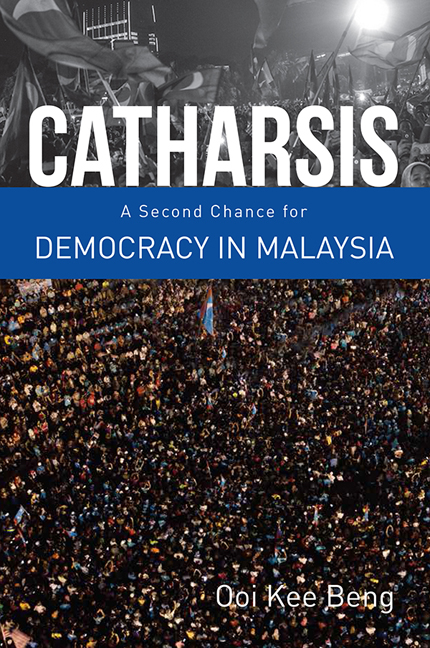Book contents
- Frontmatter
- Contents
- Foreword
- 1 Introduction – Malaysia's Future Is Redeemed
- Before Pakatan Harapan
- Before 9 May 2018
- 12 Racialising the Un-racialisable: What Is the Red Shirt Rally All About?
- 13 One Country's Merdeka Is Another's Damage Control
- 14 Malaysia – Where Politics Must Be Ethnically Inclusive and Exclusive at the Same Time
- 15 Is Malaysia at a Crossroads or in a Quagmire?
- 16 Unity Without Solidarity Sows Disunity
- 17 UMNO and Looking Back at History
- 18 Sarawak Forces Federal Opposition to Do Deep Soul-searching. But Can It?
- 19 By-elections Reveal New Malay Politics
- 20 Interview with Mahathir Mohamad: ‘People Must Be Able to Hold Their Heads Up.’
- 21 Malaysia Has to Start Re-examining Its Histories
- 22 Waves from US Probe into 1MDB May Turn into Tsunami
- 23 Seeking a New Formula to Unite Malaysia's Diversity
- 24 Time for Anwar to Accept Mahathir's Olive Branch?
- 25 Najib, Mahathir and the Timing of Malaysia's Polls
- 26 Excessive Governance Is Not Good Governance
- 27 Why Malaysia's Opposition Will Take to the Streets Again
- 28 Merdeka is About The Individual, Too
- 29 A Battle Between Malay Leaders Over Malaysia's Future
- 30 The Primacy of Political Economy in Asia
- With Mahathir at the Helm
- Beyond 9 May 2018
- About the Author
28 - Merdeka is About The Individual, Too
from Before 9 May 2018
Published online by Cambridge University Press: 12 February 2019
- Frontmatter
- Contents
- Foreword
- 1 Introduction – Malaysia's Future Is Redeemed
- Before Pakatan Harapan
- Before 9 May 2018
- 12 Racialising the Un-racialisable: What Is the Red Shirt Rally All About?
- 13 One Country's Merdeka Is Another's Damage Control
- 14 Malaysia – Where Politics Must Be Ethnically Inclusive and Exclusive at the Same Time
- 15 Is Malaysia at a Crossroads or in a Quagmire?
- 16 Unity Without Solidarity Sows Disunity
- 17 UMNO and Looking Back at History
- 18 Sarawak Forces Federal Opposition to Do Deep Soul-searching. But Can It?
- 19 By-elections Reveal New Malay Politics
- 20 Interview with Mahathir Mohamad: ‘People Must Be Able to Hold Their Heads Up.’
- 21 Malaysia Has to Start Re-examining Its Histories
- 22 Waves from US Probe into 1MDB May Turn into Tsunami
- 23 Seeking a New Formula to Unite Malaysia's Diversity
- 24 Time for Anwar to Accept Mahathir's Olive Branch?
- 25 Najib, Mahathir and the Timing of Malaysia's Polls
- 26 Excessive Governance Is Not Good Governance
- 27 Why Malaysia's Opposition Will Take to the Streets Again
- 28 Merdeka is About The Individual, Too
- 29 A Battle Between Malay Leaders Over Malaysia's Future
- 30 The Primacy of Political Economy in Asia
- With Mahathir at the Helm
- Beyond 9 May 2018
- About the Author
Summary
Malaya gained independence on 31 August 1957 and Malaysia on September 16, 1963. Those historic dates mark the end of British colonial control over the Malay Peninsula and northern Borneo.
More significantly, they mark the beginning of painful but hopeful times for the citizens and the leaders of the new country. They point forward, not backwards to the past.
In general academic parlance, a twin process of state building and nation building kicked in at those points. (I have discussed these matters before in this column, so I will skip the details here.)
However, there are other aspects of independence that are often considered – not only in Malaysia but in most new nations to be of low priority, whose development is therefore actually ignored or even consciously hampered.
The question that needs asking then is: ‘Why independence?’
The answer to that very important question is twofold. Firstly, the issue simply regards the question of self-determination. Freedom from external control and abuse was the immediate objective.
But what about the longer term?
Beyond the interest of state and nation lie the interests of the individual – the citizen, if you like. In the rush to build nation and state, what was a major point in gaining Merdeka – namely the development of the individual Malaysian citizen as an independent and intelligent modern person capable of handling modern challenges – has been neglected.
If we reduce state building to a matter of security, and nation building to one on identity, and the both of them synchronised as a matter of economic growth, we see how the development of the integrity of the individual Malaysian is overshadowed, notwithstanding the rhetoric.
It can be argued that the long-term goal of Merdeka is the empowerment of the individual – not of the state, not of the nation, not of the economy. Those are processes that pave the way. They are the means. The end is the creation of citizens imbued with a strong sense of integrity. That was what Bangsa Malaysia was aiming at.
And that is why rights such as the freedom of assembly, the freedom of association and the freedom of speech are so vital. They allow for citizens to experience and nurture their sense of agency.
- Type
- Chapter
- Information
- CatharsisA Second Chance for Democracy in Malaysia, pp. 99 - 101Publisher: ISEAS–Yusof Ishak InstitutePrint publication year: 2018

